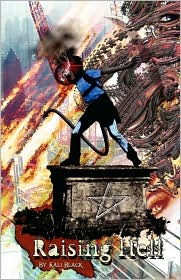
I think my best description of this book is to consider it an “invitation.” Right from the introduction, Kali Black asks the reader to take what they know, or what they think they know, and question it. In fact, she reminds us to question information not only from sources we doubt, but also from those we do not. Asking oneself why we accept “this” as opposed to “that” is always a good exercise, and one that many of us do not do often enough.
It is that invitation to question, to think, that successfully carried me through the book. Depending upon your personal views and experiences, some of what she presents may not resonate with you. It may, in fact, make you shake your head in wonder. But that, in part, seems to be the purpose. To make you think, to make you question, to open up a dialogue, even if it is only a dialogue with yourself. To become AWARE, of self, of environment, of social expectations, so you can choose your path with integrity and intent.
I did find the writing style to be rather uneven in places. She presents her views and arguments regarding black magic (which could possibly be considered Chaos magic in fresh robes) in strong, logical terms. Then we get to the chapter on meat-eating, and logic gives way to pure ranting. The next chapter addressing organized religions is only marginally better. And the cursing interspersed throughout the book is wildly uneven - sometimes clearly for shock value, sometimes conversational, and sometimes apparently because she hasn’t dropped in an f-bomb in a while. I’m no prude (I can “curse like a sailor,” much to my mother’s chagrin), but I’d rather she keep it in context. Bearing in mind that the main tenet of this book is to question, however, the reader can take a step back and approach these uneven areas with an eye toward self-discovery and awareness.
Later, in her chapter regarding ritual design and initiation, I found myself struggling again. Remember, she began the book by charging you to question anything and everything you know, to never take anything as rote until you have truly examined it on your own. Yet in this final chapter, she uses phrases such as “you must” or “it is essential to include this step” in the initiation ritual. It seems contradictory to me, as though she asks you to question everything except what she says to be true.
There are certainly ideas within this book with which I don’t agree, or at least I seriously question. But that is really the essence of the missive. In fact, I think this is what makes the book an excellent basis for a discussion group. While much of what she presents is not necessarily original, it is thought-provoking. Regardless of what specific points I agreed or disagreed with, overall I enjoyed the challenge to rethink my views.
The only real complaint I have is the lack of footnotes or endnotes. Facts or ideas are often presented without supporting references. She recommends using the first part of the “Betty Erickson technique” as though every person reading the book will know exactly to what she is referring. She does provide a reasonable bibliography, but that doesn’t help with specific references.
Finally, a short word of warning for anyone with bad eyesight: the font used by the typesetter is relatively small, so make sure your eyeglass prescription is up-to-date!
~review by KatSai
Author: Kali Black
Megalithica Books, 2009
pp. 134, $19.99
